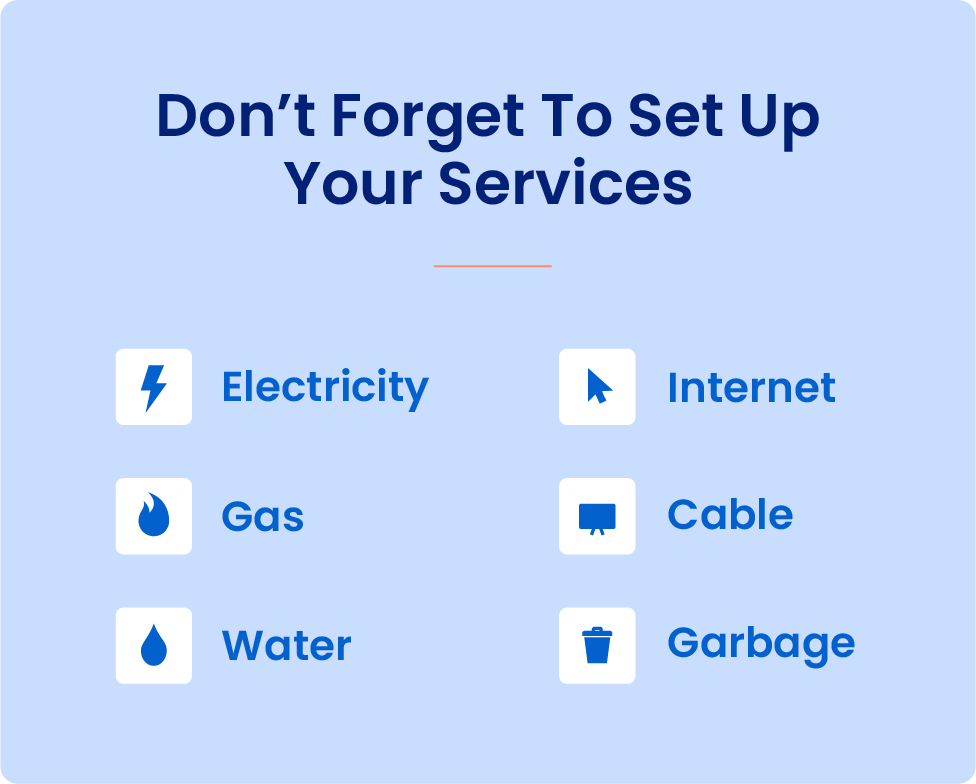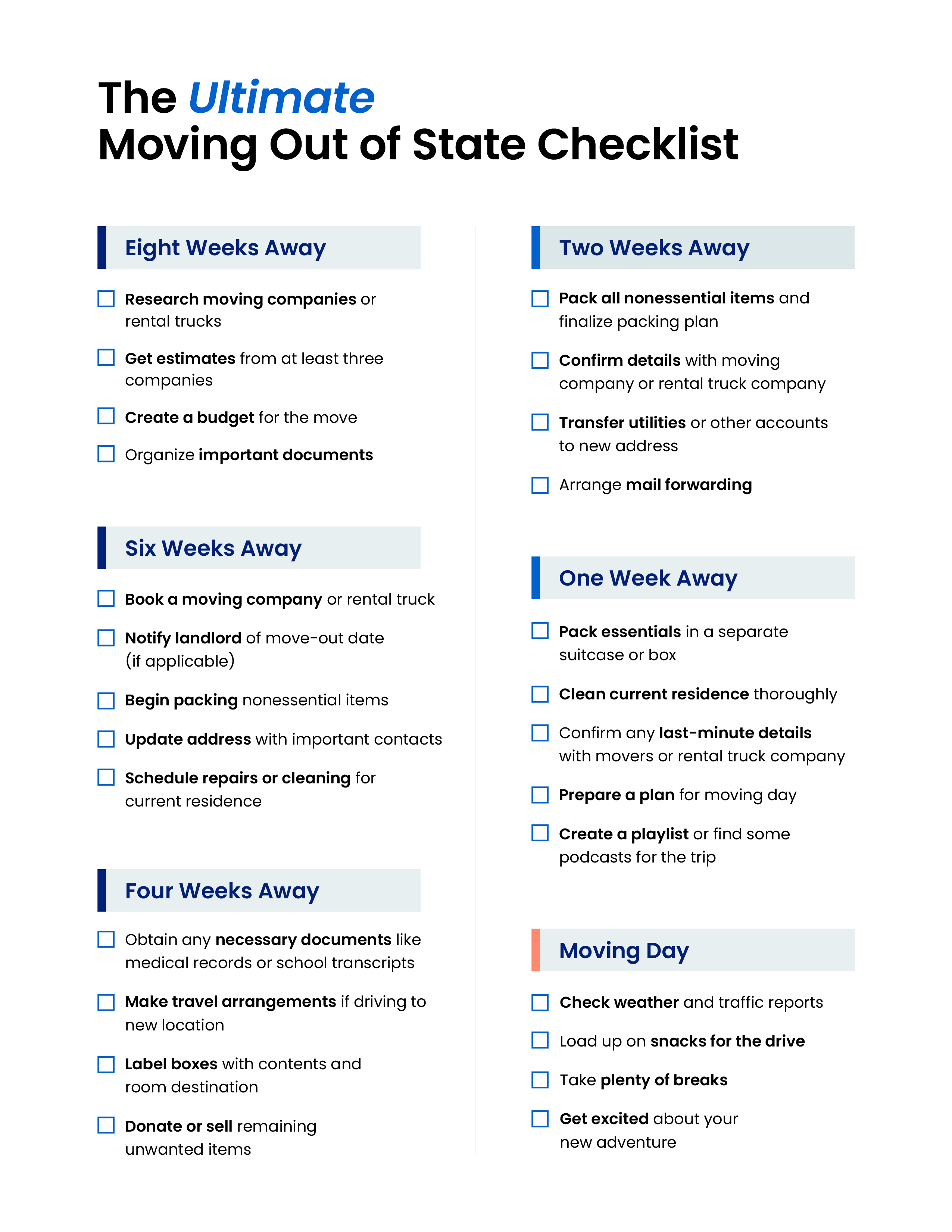12 Top Tips for Moving Out of State [+Timeline and Checklist]
April 03rd, 2023
![12 Top Tips for Moving Out of State [+Timeline and Checklist]](/storage/blogposts/April2023/medium/jMXxd309LBUKy0BBRciO.jpg)
Moving out of state can be an exhilarating and nerve-wracking experience, but with careful planning and preparation, it can also be an exciting opportunity to explore new places, meet new people, and create a fulfilling life.
In this post, we'll share some tips for moving out of state to help make your move as smooth as possible so you can embrace the adventure that comes with starting fresh in a new location.
1. Do Your Homework
Whether you’re moving for work, family, or just for a change of scenery, doing a bit of research before you hit the road will make a huge difference in the long run.
Here are a few things you should consider:
-
What is the cost of living in your new city?
-
Are there any special regulations or taxes that don’t exist in your current state?
-
How stable is the job market?
-
How are the schools?
-
Are you heading to a state where the weather is different from what you’re used to?
Fortunately, there are a lot of online resources to help you answer these questions. Check out local publications or news channels, state and city resources, and even forums like Reddit or Nextdoor to get a better idea of what to expect before diving into your new neighborhood.
2. Create a Budget
Moving costs can add up quickly, but a little planning can go a long way. Figure out exactly how much money you have to spend on moving-related expenses and create a budget so you can be prepared.
You should take into account things like:
-
Gasoline
-
Mover fees
-
Rental deposits
-
Utility setup fees
Additionally, research potential tax deductions you may be eligible for when moving out of state, as these can help offset some of the costs.
Once you have your budget, stick to it. Being mindful of your expenses can help minimize the financial stress that comes with making a big move.
3. Figure Out Your Employment Situation
If you don’t already have a job secured, you’ll want to get ahead of that before you arrive in your new state.
Research potential employers in the area and start sending out applications before the move so you can get a head start. It’s also important to be aware of any licensing or certification requirements that may be specific to your new home state.
If you’re working from home or if your current employer is relocating you, you’ll want to double-check any potential tax implications that may come with the move.
4. Pick a Date
Moving out of state is a big undertaking, and planning a move without a specific date in mind can make it even more difficult.
Factors like work, family, and weather can have a big impact on your moving date.
For example, families with kids tend to move in the spring so they have enough time to set up before the next school year begins.
Here are a few things you might consider before packing up your entire life:
-
Do you have kids? If so, when should they start school in the new state?
-
Are there any special events you want to be present for?
-
What’s the weather like in your new state? Is it better to move in the summer or winter?
-
How much notice do you need to give your current landlord, employer, and other important parties?
Once you have answers to these questions, set a date and use it as your guiding star. This will help keep you on track and make sure everything is taken care of on time.
5. Declutter and Downsize
Moving out of state is a great opportunity to declutter and downsize your belongings.
Start by going through all the items in your house and deciding what you want to take with you and what you can donate, throw away, or sell.
This will make packing much easier and help save on costs. Plus, it certainly makes the feeling of a “fresh start” a little more real!
6. Start Packing Strategically
Packing can be overwhelming, especially if you don’t have a strategy ahead of time.
Here are a few steps you can take to streamline the packing process:
Create an inventory list: Make a list of the items you’re taking with you and take pictures to document their condition. This will help ensure everything arrives safe and sound at your new residence.
Pack by room: Instead of trying to pack all of your things at once, try packing one room at a time. This way, it’s easier to keep track of what needs to be packed and where it should go when it arrives.
Label your boxes: Label each box with its contents and the room where it should be unpacked for easy organization.
Pack an essentials bag: Put a few essential items like a toothbrush and a change of clothes in a designated bag or suitcase so they’re accessible when you arrive at your new home.
Start early: Give yourself plenty of time to pack, especially if you have a lot of items to move. This way, you can take your time to organize your belongings and avoid a rushed packing experience.
With these tips in mind, you'll be well on your way to a successful move!
7. Find Movers or Rent a Truck
It’s time for the moving decision everyone dreads: hire movers or rent a truck?
If you have a lot of stuff to move or if you're moving far away, then hiring movers might be the best option. Professional movers will take care of the packing, lifting, and loading, so you don't have to worry about it. Plus, you won't have to drive a giant truck across the country!
If you're moving a state or two away or if your stuff isn’t too heavy, then renting a truck might be the way to go. Many companies offer discounts for midweek or off-season moves.
Be sure to book your movers or moving truck as soon as you have a date to ensure they're available when it's time to hit the road.
8. Update Your Paperwork
Paperwork is an often overlooked and particularly boring piece of the moving process, but it’s important to make sure everything is in order and up to date before moving out of state.
Here are a few things you should consider handling ahead of time:
-
Changing your address with the post office
-
Changing your vehicle registration and driver’s license to your new state
-
Transferring your medical records
-
Updating your voting registration
-
Updating billing or shipping information on online accounts
-
Notifying your bank and other financial institutions of your address change
Take care of these tasks as early as possible to ensure a smooth transition. It’s also helpful to make copies of all important documents before packing them away. That way, you have easy access if needed during the move.
9. Set Up Your Services
No one wants to arrive at their new home only to realize they have no running water! Setting up utility and other services ahead of time can make sure you're nice and comfy as soon as you settle into your new home.
Here are some services you may consider activating before the big move:
-
Electricity
-
Gas
-
Water
-
Internet
-
Cable or satellite
-
Garbage collection
Many companies offer online sign-ups, so it’s easy to get started even when you’re out of state. You can usually find information on their website or give them a call for more details.

10. Don’t Forget About Your Pets and Plants
Moving can be a stressful time for your furry family members, so it’s important to provide them with the necessary care during the transition. If your pet is traveling by plane, schedule an appointment with your vet to ensure they have all the necessary vaccinations and paperwork before departing.
Don’t forget about your plants, either. If your house is full of plants and you want to take them along for the ride, be sure to check USDA restrictions and your new state's department of agriculture to make sure everything is up to code.
11. Plan Your Travel Route
Heading into the unknown can be fun, but there's a time and place for everything.
Planning a route before you leave will provide you with an idea of how long the trip will take, where you can rest, and how much food and gas you may need.
Here are a few tips that can help make your voyage a little easier:
-
Plot out a few rest stops along the way to stretch your legs and avoid fatigue.
-
Plan any meals or snacks you might need during the expedition.
-
Research local attractions to break up the trip.
-
Check weather forecasts before your journey.
-
Pack a first aid kit in case of any medical emergencies.
-
Be aware of speed limits and road rules in each state you’ll be traveling through.
-
Book any hotels or campsites you may stop at ahead of time.
If you have small children traveling with you, plan activities they can do while in transit. This will help keep them entertained during long car rides or flights.
12. Take Care of Yourself
Moving is hard, and adjusting to a new place can be tough, too. Make sure you practice some self-care throughout the process.
Get plenty of rest, stay hydrated, and eat healthy meals. This includes travel time — don’t forget to pack nutritious snacks and a big water bottle for the road.
Finally, make time to do some fun things once you arrive at your new home, like trying out a new restaurant or walking to your local coffee shop. Not only will this help you learn the lay of the land, but you may even meet some new people!
Example Timeline and Checklist
Here is an example timeline and checklist you can use to make your trip a little easier:

8 Weeks
-
Research moving or rental truck companies.
-
Get estimates from at least three companies.
-
Create a budget for the move.
-
Organize important documents.
6 Weeks
-
Book a moving company or rental truck.
-
Notify your landlord of your move-out date (if applicable).
-
Begin packing nonessential items.
-
Update your address with important contacts.
-
Schedule repairs or cleaning for your current residence.
4 Weeks
-
Obtain any necessary documents like medical records or school transcripts.
-
Make travel arrangements if you’ll be driving to a new location.
-
Label boxes with contents and room destination.
-
Donate or sell remaining unwanted items.
2 Weeks
-
Pack all nonessential items and finalize the packing plan.
-
Confirm details with the moving or rental truck company.
-
Transfer utilities or other accounts to your new address.
-
Arrange mail forwarding.
1 Week
-
Pack essentials in a separate suitcase or box.
-
Clean your current residence thoroughly.
-
Confirm any last-minute details with the movers or rental truck company.
-
Prepare a plan for moving day.
-
Create a playlist or find some podcasts for the trip.
Moving Day
-
Check weather and traffic reports.
-
Load up on snacks for the drive.
-
Take plenty of breaks.
-
Get excited about your new adventure!
Moving Out of State FAQ
Here are a few frequently asked questions about moving out of state.
What Is the First Step in Moving Out of State?
The first step in moving out of state is to research your new location thoroughly. This includes researching the cost of living, the job market, the housing market, schools (if you have children), and any other factors that are important to you. Knowing as much as possible about your new location will help you make informed decisions about the move and reduce the likelihood of unexpected surprises.
What Is the Process of Moving to a Different State?
The process of moving to a different state can be broken down into 12 steps: research your new location, create a budget, figure out your job situation, pick a date, declutter and downsize, start packing, find movers or rent a truck, update your paperwork, set up services, take care of your pets and plants, plan a route, and practice self-care throughout the whole ordeal.
Why Is It Hard To Move to Another State?
Moving to another state can be challenging for several reasons. One of the biggest obstacles is the logistics of physically transporting your belongings from one place to another, especially if you're moving a long distance. This requires careful planning and coordination to ensure everything arrives safely and on time. Moving to a new state also often involves navigating unfamiliar laws, regulations, and paperwork related to things like taxes, driver's licenses, and voter registration.
How Do I Start Over in a New State?
Join local clubs or organizations that align with your interests to meet new people who share similar hobbies. Take time to explore your new surroundings by visiting local attractions and trying out nearby restaurants. Use technology to stay in touch with friends and family back home while also embracing opportunities to make connections in your new community. By taking proactive steps to establish yourself in your new location, you can create a fulfilling life and enjoy all the benefits that come with a fresh start.
Moving Out of State Doesn’t Have To Be Stressful
Moving out of state can be an emotional but rewarding experience. By following these tips and making good use of this checklist, you can make the transition a little easier. Remember to plan ahead and stay organized, but don’t forget to take care of yourself!
With a positive attitude and a willingness to adapt, you'll be on your way to creating a happy and fulfilling life in your new home.
Ready to find your new out-of-state home? UpHomes can help!

Ryan Fitzgerald
Hi there! My name is Ryan Fitzgerald, and I am a REALTOR®. My goal is to help you learn more about real estate through our Real Estate Blog! Hopefully, you enjoyed the above blog post and it found a way to provide help or value to you. When you're ready to buy or sell a home of your own let us know here. Please feel free to join the conversation by dropping us a comment below.

